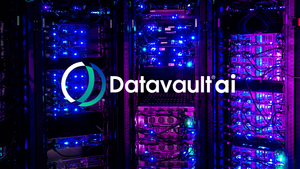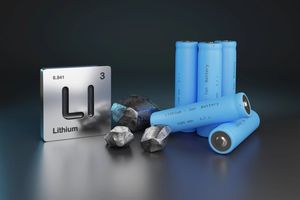
San Jose, CA – November 20, 2025 – In a strategic move poised to reshape the landscape of artificial intelligence infrastructure, Smartkem (NASDAQ: SMTK) and Jericho Energy Ventures (TSX-V: JEV, OTC: JROOF) have announced a proposed all-stock merger. The ambitious goal: to create a U.S.-owned and controlled AI-focused infrastructure company, leveraging cutting-edge semiconductor innovations for the next generation of AI data centers. This merger, initially outlined in a non-binding Letter of Intent (LOI) signed on October 7, 2025, and extended on November 20, 2025, aims to address the escalating demand for AI compute capacity by vertically integrating energy supply with advanced semiconductor materials and packaging.
The combined entity seeks to deliver faster, more efficient, and resilient AI infrastructure by marrying Smartkem's patented organic semiconductor technology with Jericho's scalable energy platform. This synergistic approach is designed to tackle the formidable challenges of power consumption, heat management, and cost associated with the exponential growth of AI, promising a new era of sustainable and high-performance AI computing within a secure, domestic framework.
Technical Synergy: Powering AI with Organic Semiconductors and Resilient Energy
The heart of this proposed merger lies in the profound technical synergy between Smartkem's advanced materials and Jericho Energy Ventures' robust energy solutions. Smartkem's contribution is centered on its proprietary TRUFLEX® semiconductor polymers, a groundbreaking class of organic thin-film transistors (OTFTs). Unlike traditional inorganic semiconductors that demand high processing temperatures (often exceeding 300°C), TRUFLEX materials enable ultra-low temperature printing processes (as low as 80°C). These liquid polymers can be solution-deposited onto cost-effective plastic or glass substrates, allowing for panel-level packaging that can accommodate hundreds of AI chips on larger panels, a significant departure from the limited yields of 300mm silicon wafers. This innovation is expected to drastically reduce manufacturing costs and energy consumption for semiconductor components, while also improving throughput and cost efficiency per chip.
Smartkem's technology is poised to revolutionize several critical aspects of AI infrastructure:
- Advanced AI Chip Packaging: By reducing power consumption and heat at the chip level, Smartkem's organic semiconductors are vital for creating denser, more powerful AI accelerators.
- Low-Power Optical Data Transmission: The technology facilitates faster and more energy-efficient interconnects within data centers, crucial for the rapid communication required by large AI models.
- Conformable Sensors: The versatility extends to developing flexible sensors for environmental monitoring and ensuring operational resilience within data centers.
Jericho Energy Ventures complements this with its expertise in providing scalable, resilient, and low-cost energy. JEV leverages its extensive portfolio of long-producing oil and gas joint venture assets and infrastructure in Oklahoma. By harnessing abundant, low-cost on-site natural gas for behind-the-meter power, JEV aims to transform these assets into secure, high-performance AI computing hubs. Their build-to-suit data centers are strategically located on a U.S. fiber "superhighway," ensuring high-speed connectivity. Furthermore, JEV is actively investing in clean energy, including hydrogen technologies, with subsidiaries like Hydrogen Technologies developing zero-emission boiler technology and Etna Solutions working on green hydrogen production, signaling a future pathway for more sustainable energy integration.
This integrated approach differentiates itself from previous fragmented systems by offering a unified, vertically integrated platform that addresses both the hardware and power demands of AI. This holistic design, from energy supply to advanced semiconductor materials, aims to deliver significantly more energy-efficient, scalable, and cost-effective AI computing power than conventional methods.
Reshaping the AI Competitive Landscape
The proposed merger between Smartkem and Jericho Energy Ventures carries significant implications for AI companies, tech giants, and startups alike, potentially introducing a new paradigm in the AI infrastructure market.
The creation of a vertically integrated, U.S.-owned entity for AI data centers could intensify competition for established players in the semiconductor and cloud computing sectors. Tech giants like Nvidia (NASDAQ: NVDA), Intel (NASDAQ: INTC), AMD (NASDAQ: AMD) in semiconductors, and cloud providers such as Amazon (NASDAQ: AMZN) (AWS), Google (NASDAQ: GOOGL) (GCP), and Microsoft (NASDAQ: MSFT) (Azure) could face a new, formidable alternative. The merged company's focus on energy-efficient AI chip packaging and resilient, low-cost power solutions could offer a compelling alternative, potentially leading to supply chain diversification for major players seeking to reduce reliance on a limited number of providers. This could also spur partnerships or even future acquisitions if the technology proves disruptive and scalable.
For AI startups, this development could be a double-edged sword. On one hand, if the combined entity successfully delivers more energy-efficient and cost-effective AI infrastructure, it could lower the operational costs associated with advanced AI development, making high-end AI compute more accessible. This could foster innovation by allowing startups to allocate more resources to model development and applications rather than grappling with prohibitive infrastructure expenses. On the other hand, a powerful, vertically integrated player could also intensify competition for talent, funding, and market share, especially for startups operating in niche areas of AI chip packaging or energy solutions for data centers.
Companies that stand to benefit most include AI data center operators seeking improved efficiency and resilience, and AI hardware developers looking for advanced, cost-effective chip packaging solutions. Crucially, as a U.S.-owned and controlled entity, the combined company is strategically positioned to benefit from government initiatives and incentives aimed at bolstering domestic AI infrastructure and securing critical supply chains. This market positioning offers a unique competitive advantage, appealing to clients and government contracts prioritizing domestic sourcing and secure infrastructure for their AI initiatives.
A Broader Stroke on the AI Canvas
The Smartkem Jericho merger is more than just a corporate transaction; it represents a significant development within the broader AI landscape, addressing some of the most pressing challenges facing the industry. Its emphasis on energy efficiency and a U.S.-owned infrastructure aligns perfectly with the growing global trend towards "Green AI" and responsible technological development. As AI models continue to grow in complexity and scale, their energy footprint has become a major concern. By offering an inherently more energy-efficient infrastructure, this initiative could pave the way for more sustainable AI development and deployment.
The strategic importance of a U.S.-owned AI infrastructure cannot be overstated. In an era of increasing geopolitical competition, ensuring domestic control over foundational AI technologies is crucial for national security, economic competitiveness, and technological leadership. Jericho's leveraging of domestic energy assets, including a future pathway to clean hydrogen, contributes significantly to energy independence for critical AI operations. This helps mitigate risks associated with foreign supply chain dependencies and ensures a resilient, low-cost power supply for the surging demand from AI compute growth within the U.S. The U.S. government is actively seeking to expand AI-ready data centers domestically, and this merger fits squarely within that national strategy.
While the potential is immense, the merger faces significant hurdles. The current non-binding Letter of Intent means the deal is not yet finalized and requires substantial additional capital, rigorous due diligence, and approvals from boards, stockholders, and regulatory bodies. Smartkem's publicly reported financial challenges, including substantial losses and a high-risk financial profile, underscore the need for robust funding and a seamless integration strategy. The scalability of organic semiconductor manufacturing to meet the immense global demand for AI, and the complexities of integrating a novel energy platform with existing data center standards are also considerable operational challenges.
If successful, this merger could be compared to previous AI infrastructure milestones, such as the advent of GPUs for parallel processing or the development of specialized AI accelerators (ASICs). It aims to introduce a fundamentally new material and architectural approach to how AI hardware is built and powered, potentially leading to significant gains in performance per watt and overall efficiency, marking a similar strategic shift in the evolution of AI.
The Road Ahead: Anticipated Developments and Challenges
The proposed Smartkem and Jericho Energy Ventures merger sets the stage for a series of transformative developments in the AI infrastructure domain, both in the near and long term. In the immediate future, the combined entity will likely prioritize the engineering and deployment of energy-efficient AI data centers specifically designed for demanding next-generation workloads. This will involve the rapid integration of Smartkem's advanced AI chip packaging solutions, aimed at reducing power consumption and heat, alongside the implementation of low-power optical data transmission for faster internal data center interconnects. The initial focus will also be on establishing conformable sensors for enhanced environmental monitoring and operational resilience within these new facilities, solidifying the vertically integrated platform from energy supply to semiconductor materials.
Looking further ahead, the long-term vision is to achieve commercial scale for Smartkem's organic semiconductors within AI computing, fully realizing the potential of its patented platform. This will be crucial for delivering on the promise of foundational infrastructure necessary for scalable AI, with the ultimate goal of offering faster, cleaner, and more resilient AI facilities. This aligns with the broader industry push towards "Green AI," aiming to make advanced AI more accessible and sustainable by accelerating previously compute-bound applications. Potential applications extend beyond core data centers to specialized AI hardware, advanced manufacturing, and distributed AI systems requiring efficient, low-power processing.
However, the path forward is fraught with challenges. The most immediate hurdle is the finalization of the merger itself, which remains contingent on a definitive agreement, successful due diligence, significant additional capital, and various corporate and regulatory approvals. Smartkem's publicly reported financial health, including substantial losses and a high-risk financial profile, highlights the critical need for robust funding and a seamless integration plan. Operational challenges include scaling organic semiconductor manufacturing to meet the immense global demand for AI, navigating complex energy infrastructure regulations, and ensuring the seamless integration of Jericho's energy platform with evolving data center standards. Furthermore, Smartkem's pivot from display materials to AI packaging and optical links requires new proof points and rigorous qualification processes, which are typically long-cycle in the semiconductor industry.
Experts predict that specialized, vertically integrated infrastructure solutions, such as those proposed by Smartkem and Jericho, will become increasingly vital to sustain the rapid pace of AI innovation. The emphasis on sustainability and cost-effectiveness in future AI infrastructure is paramount, and this merger reflects a growing trend of cross-sector collaborations aimed at capitalizing on the burgeoning AI market. Observers anticipate more such partnerships as the industry adapts to shifting demands and seeks to carve out shares of the global AI infrastructure market. The market has shown initial optimism, with Smartkem's shares rising post-announcement, indicating investor confidence in the potential for growth, though the successful execution and financial stability remain critical factors to watch closely.
A New Horizon for AI Infrastructure
The proposed all-stock merger between Smartkem (NASDAQ: SMTK) and Jericho Energy Ventures (TSX-V: JEV, OTC: JROOF) marks a potentially pivotal moment in the evolution of AI infrastructure. By aiming to create a U.S.-owned, AI-focused entity that vertically integrates advanced organic semiconductor technology with scalable, resilient energy solutions, the combined company is positioning itself to address the fundamental challenges of power, efficiency, and cost in the age of exponential AI growth.
The significance of this development in AI history could be profound. If successful, it represents a departure from incremental improvements in traditional silicon-based infrastructure, offering a new architectural paradigm that promises to deliver faster, cleaner, and more resilient AI compute capabilities. This could not only democratize access to high-end AI for a broader range of innovators but also fortify the U.S.'s strategic position in the global AI race through enhanced national security and energy independence.
In the coming weeks and months, all eyes will be on the progress of the definitive merger agreement, the securing of necessary capital, and the initial steps towards integrating these two distinct yet complementary technologies. The ability of the merged entity to overcome financial and operational hurdles, scale its innovative organic semiconductor manufacturing, and seamlessly integrate its energy solutions will determine its long-term impact. This merger signifies a bold bet on a future where AI's insatiable demand for compute power is met with equally innovative and sustainable infrastructure solutions.
This content is intended for informational purposes only and represents analysis of current AI developments.
TokenRing AI delivers enterprise-grade solutions for multi-agent AI workflow orchestration, AI-powered development tools, and seamless remote collaboration platforms.
For more information, visit https://www.tokenring.ai/.





